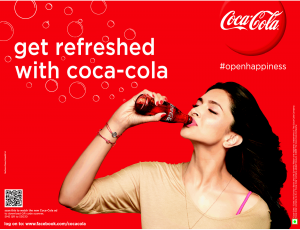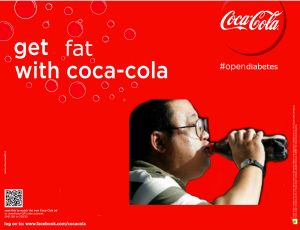Original Ad:

My original ad is a typical coca-cola ad with a happy individual drinking coke and their slogan “open happiness”. We’ve all drank coca-cola as a kid, we fondly remember the coke commercials during Christmas time and get nostalgic when we see santa clause drinking a bottle of coke on the television. Coca-cola invokes happiness and nostalgia when we see their ads. People smiling and having a good time with a can of coca-cola insinuates that you’ll be happier if you drink coke. In this ad, a woman is portrayed drinking a bottle of coca-cola with a very content and relaxing expression. Ads often use our emotions to convince us to purchase their products. Buzzwords like refreshing and happiness stand out to us because we all want to feel positive emotions. What coca-cola wants us to forget is just how unhealthy their products are. Promoting such unhealthy products to children and families is a big reason why childhood obesity is so prevalent. By using words like happiness and refreshing, coca-cola can divert our attention from the negative aspects such as how it can impact someone’s health. Media and advertisements have become a tool for companies to exploit and manipulate the public so they buy into what they are trying to sell or the message they want us to hear. I hope to jam this ad in a way that can portray the negative impact coke can have on your health and shift the perspective to invoke negative emotions.
Jammed Ad:

Coca-Colas original advertisement promoted their product by engaging our emotions using buzzwords like happiness and refreshing, and having a relatively mundane everyday looking person as a model so we can relate to the image. I wanted to jam this ad by changing these two main things that captures an audience’s attention. I decided to alter buzzwords to represent the negative effects coke can have on your health and changed the model to reflect that.
Get fat with coca cola and #opendiabetes were the alterations I made to the buzzwords used in the ad. Getting fat and diabetes go hand in hand, and coca-cola does not promote the consumption of their products in moderation for obvious reasons. I wanted to show what can happen when you drink too much coca-cola while preserving much of the original advertisement to show that a few small changes can shift the perspective greatly. Changing the model to an obese man drinking coke present an image of what could be for someone who enjoys coca-cola. Similar to how coca-cola presented the ad, I wanted to use an image that is attainable. An average obese man is something everyone can understand and relate it to coca-cola consumption.
My changes to the ad were meant to represent the negative aspects of consuming coca-cola. While many people enjoy a nice cold can of coke on a hot summer day, it is important to understand exactly what it is we are drinking. By changing the buzzwords from refreshing to fat and happiness to diabetes, it stimulates the opposite emotions that the original ad intended. While we can’t expect companies to advertise the unhealthy aspects of their products, it is important to spread awareness to do their research on the everyday food and drinks they consume. I am hoping that my jammed ad can help people realize that drinking too much coke or soda in general can have a big impact on your health and to promote smart consumerism.
Works Cited:
Shah, Shweta. “This New Coca-Cola Ad Is As Adorable As Deepika Padukone.” Tell Me Nothing, 20 Apr. 2017, tellmenothing.com/2017/04/20/new-coca-cola-ad-adorable-deepika-padukone/.
MacMillan, Amanda. “Stop Drinking Soda, for (Your Own) Good.” CNN, Cable News Network, 27 Mar. 2015, www.cnn.com/2015/03/27/health/stop-drinking-soda/index.html.